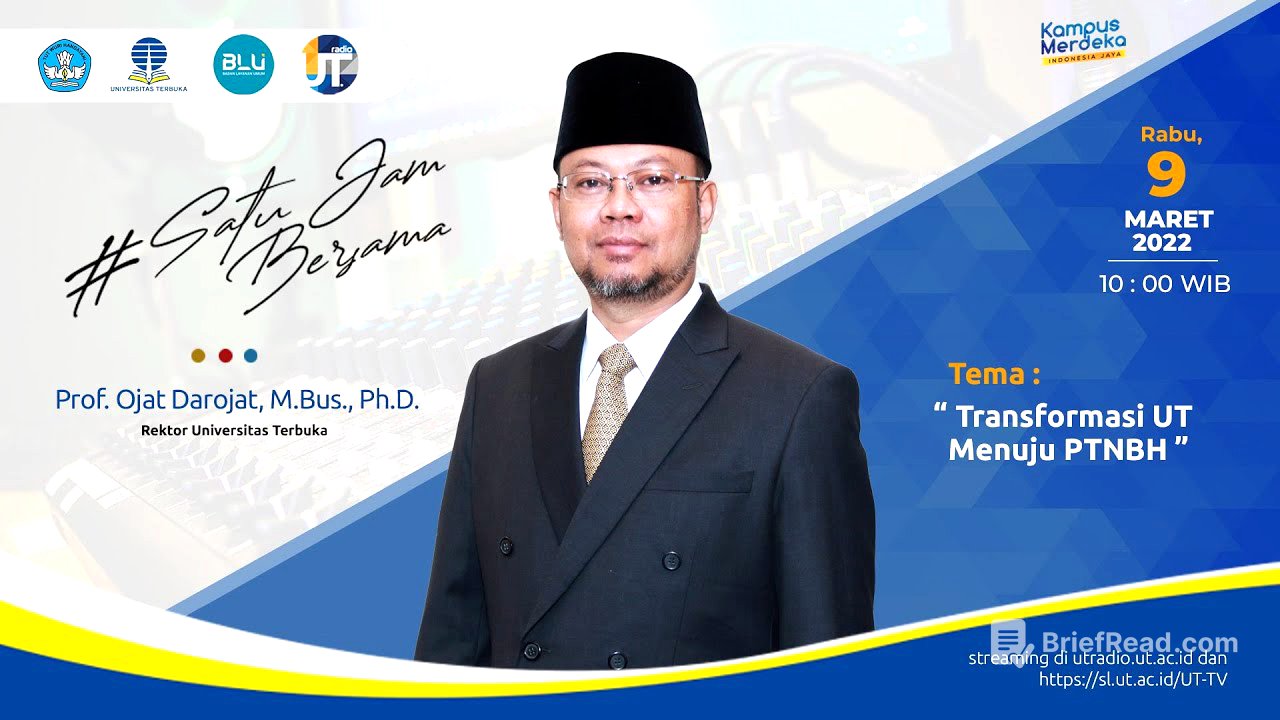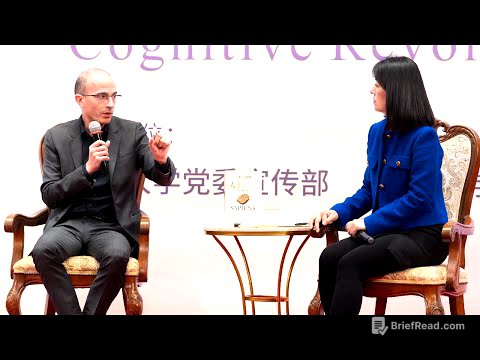TLDR;
This video features a discussion with the Rector of Universitas Terbuka (UT), Professor Ojat Darojat, about UT's transformation towards becoming a State University with Legal Entity Status (PTN BH). The discussion covers the reasons behind this transformation, the differences between UT's current status and PTN BH, the preparations involved, challenges faced, and the benefits and increased responsibilities that come with the new status. The Rector also addresses questions from viewers, providing insights into various aspects of UT's operations and future plans.
- UT is transforming to PTN BH to stay competitive and improve services.
- The transformation grants UT greater autonomy in academic and administrative matters.
- UT faces challenges in aligning perceptions with the Ministry regarding its unique distance learning model.
- The focus remains on enhancing the quality of services for students and adapting to the evolving educational landscape.
Intro [0:00]
The program "One Hour Together" features a discussion with Professor Ojat Darojat, the Rector of Universitas Terbuka (UT), about UT's transformation towards becoming a State University with Legal Entity Status (PTN BH). The discussion will cover the reasons behind this transformation, the preparations involved, and the benefits of achieving PTN BH status.
Background and Motivation for Transformation [0:40]
The Rector explains that the transformation is driven by the evolving landscape of higher education, particularly the increasing adoption of online learning by traditional universities. This shift, accelerated by the COVID-19 pandemic, necessitates UT to adapt and maintain its position as a leader in distance education. Additionally, changes in regulations now allow other universities to offer distance learning programs, which was previously UT's exclusive domain. To remain competitive and provide quality education to a broad audience, UT aims to achieve PTN BH status, granting it greater autonomy and flexibility.
Differences Between PTN-BLU and PTN-BH [7:45]
The key difference lies in the level of autonomy. As a PTN-BLU (Public Service Agency), UT has limited financial autonomy. Becoming a PTN BH would grant UT greater independence as a legal entity, allowing it to manage its resources, academic programs, and organizational structure more freely. This includes the ability to open and close study programs without seeking permission from the Ministry, and to tailor its organizational structure to better suit its distance learning model. UT as PTN BH can independently pursue legal action.
Preparations for PTN-BH Transformation [13:11]
UT has been preparing for this transformation for a long time, with efforts intensifying since 2020. A task force was formed to prepare the necessary documents and proposals. UT received approval from the Ministry in early 2021 and a Presidential Decree to proceed with the transformation. The finalization of the Government Regulation (RPP) is underway, with discussions involving various ministries. The goal is to have the PP finalized in the coming months, officially granting UT the PTN BH status.
Challenges Faced During Preparation [23:32]
The main challenge was aligning the perceptions and evaluation criteria between UT and the Ministry's evaluation team. The team often used conventional university standards, which did not fully apply to UT's unique distance learning model. This required extensive discussions and efforts to highlight the differences and ensure that UT was evaluated appropriately. Internal concerns and anxieties among UT staff regarding potential changes in employment and other aspects were also addressed through open communication and solutions.
Impact of the Pandemic on the Transformation Process [28:51]
The pandemic primarily affected the way meetings and discussions were conducted, with a shift to online platforms. While face-to-face meetings were preferred for intensive discussions, the pandemic necessitated virtual interactions. UT's experience in online learning proved beneficial, as it served as a benchmark for other universities transitioning to remote education. UT was able to highlight its strengths and contribute to the national effort to maintain educational continuity during the pandemic.
Increased Responsibilities as PTN-BH [38:23]
The primary responsibility is to enhance the quality of services provided to students. This includes improving the registration process, ensuring high-quality learning materials, enhancing online learning experiences, and improving the examination process. UT aims to provide added value to students, equipping them with the skills and knowledge needed to succeed in their studies and careers.
Changes for UT Employees [45:01]
A shift in organizational behavior and work culture is expected. Employees need to understand their roles and responsibilities within the new framework of a PTN BH. Performance appraisals will be conducted regularly, and efforts will be made to address any shortcomings in service delivery. This includes providing feedback to tutors and ensuring that they provide adequate support to students.
Viewer Questions and Answers [53:28]
The Rector addresses several questions from viewers, including:
- Recruitment of Non-PNS Staff: The Rector acknowledges that the recruitment process for non-PNS staff was not adequately publicized and promises to improve communication in future recruitment efforts.
- New Study Programs: UT plans to introduce new study programs that meet the needs of society once it achieves PTN BH status.
- Module Delivery Issues: The Rector encourages viewers who have not received their modules to provide their details so that the issue can be investigated.
- S2 Program Options: Students can pursue S2 programs in different fields than their S1 degrees, but may need to complete a matriculation program.
- Program Flexibility: UT offers both packaged (SIPAS) and non-packaged (non-SIPAS) learning options, allowing students to adjust their study load based on their individual circumstances.
Hopes for the Future [1:12:10]
The Rector expresses three hopes for UT's future as a PTN BH: that UT will be increasingly accepted by students and the public, that UT will be increasingly loved, and that UT will be increasingly successful in serving the community.









